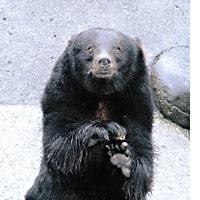In August 1985, I was in Tokyo awaiting the birth of my youngest daughter. One evening, I got a telephone call from Yoshio Kazama, my friend and next-door neighbor in Kurohime -- the beautiful corner of Nagano Prefecture where I live.
"Can you look after a bear?" he asked me.
"Never thought about it. Why, have they trapped another one?"
In those days bears, even mothers with cubs, were regularly being trapped and shot at point-blank range.
"Yes, but this one's different, it's a yami."
"Yami" means "the shadows of night," but to our local hunters it means a bear that does not have the characteristic white moon-shaped patch on its chest. Old-time hunters believed that these bears where the messengers of the mountain goddess, and did not want to kill them. I knew this because I was a member of the Hunters Association, and we often talked about the plight of bears that came down from the mountains to raid corn fields and such, mainly because their natural habitat of mixed woods had been cut and replaced by conifers.
"They're telling us to shoot her in the morning. Will you take her? You have to pay 80,000 yen."
"And get a cage built too, right?"
"I already asked. A good cage will cost 500,000 yen."
A lot of money, that, 580,000 yen. But the all-black bear might bring us luck, and with a baby coming I didn't want to risk invoking the wrath of the mountain goddess now did I?
That night, a party of hunters brought the bear in the cage trap to my land, and in the morning warned highly annoyed officials that if it was shot on the foreigner's land, he would no doubt create a fuss.
When my wife and I returned to Kurohime with our new baby daughter, Alicia, we had not only two Irish setters, but a 3- or 4-year-old female bear to look after as well. I called her Winny, after that very famous male bear called Winnie.
Winny was small, weighing maybe 50 kg, and she stood not much over 120 cm on her hind legs. My intention was to fatten her up then release her in the Joshin-etsu Kogen National Park in time for her to find a den for winter. We agreed not to try to tame her, and when it was built I put an extra fence around her cage to keep the dogs and curious people away.
Winny had an enormous appetite. She ate a box of apples a day, as well as unsalted dried fish, some dog food and, once in a while, a little honey. Oh, she loved honey! We did not want to feed her on sweet corn, as it might reinforce her appetite for it. After all, it was due to her raiding a sweet-corn field that she was caught in the first place.
Extermination permit
Then I found that it was against the law to release a bear that had been caught under a pest-extermination permit. The animal had to be kept or shot. When I said that I wanted to release her in the national park, the town officials said that if I did, then any bear damage in this area in the future would be my responsibility.
So, with Mr. Kazama helping me out by doing the feeding when I was away, we kept her. We both hated keeping a wild animal in a cage, and racked our brains as to what to do. The officials had warned me sternly not to release the bear, and I think they were cross at not getting their share of bear meat.
I wrote to zoos all over the world, asking them if they wanted a very special Japanese bear. I told them that not only would I donate the bear, but that I would pay for her air fare too. The zoos that bothered to answer all declined.
On a trip to Britain I phoned a couple of zoos and asked why they didn't want a bear. They said that the public didn't like seeing imprisoned bears, and would express pity for them.
"What about polar bears?" I asked. Most zoos have a polar bear.
"They're different, they seem to be having fun when they splash about in the pool."
As we faced the second winter with Winny still in captivity, Mr. Kazama and I were seriously thinking of shooting her. That was not only because she was costing so much money to feed, but because we honestly felt that we could see the anger and distress in her eyes.
Then one day I heard that the town of Ani, in Akita Prefecture, was planning a bear park. Ani is famous as the home of the traditional northern hunters called matagi.
So I phoned Ani town hall and asked them if they wanted a bear. No, they had bears of their own. This is special, a female, a yami. They'd never heard of a yami, so I explained that she had no moon patch. "Ah, minna guro." There you go, an "all-black" in their dialect.
They said yes, please, we would like an all-black female bear, but how much would she cost? "Nothing. I don't want money, I just want a home for her."
In February 1987, they came with a cage and a truck to collect her. Later that year I went to Ani to see how she was, and was present when she was introduced to a handsome and amorous male bear, whose ears she severely boxed.
I lost contact with Winny, but visitors to Ani sometimes told me that she was well, and had cubs. Last winter I heard that Winny was still alive and well, even though she was a grand old lady of at least 22. Then finally, in mid-September just gone, I visited Ani to see Winny again.
No sign of recognition
Bears all have distinctive faces, and there was no way that I could not recognize Winny. The keeper told me that she had had cubs five or six times, and that they had put her in the big pit with the males hoping that she would give birth to another pair. What did they feed her? Sweet corn. There's irony for you.
She showed no sign of knowing me though. Had we done the right thing in saving her life? She was living with a lot of other bears, but still she was imprisoned, with no freedom for her cubs either.
Some scientists may claim that bears don't feel happiness or sadness, but anybody who has watched them in the wild would take issue with that. Mother bears with cubs, bears splashing around in a river after salmon, or just leaning against a tree trunk with a full belly, quietly scratching and enjoying the evening sun -- I think bears enjoy life as much as the most contented of humans.
So, looking back, I'm glad Winny has had a long life, but I'm sad and sorry it wasn't a life of freedom.






